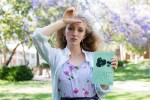Rhiannon McGavin said she loves sonnets, even if it does sound a bit pretentious.
The first-year English student has been writing sonnets and other poetry since the age of 12 and is the current Los Angeles Youth Poet Laureate. She is releasing a poetry book June 10 titled “Branches,” which consists of 28 poems that she has written over the last two years.
McGavin said poetry gives her a freedom she doesn’t see in other mediums.
“Poetry is so accepting and so fun and so important,” she said. “You can do whatever you want on the page in a way you can’t do with essays and short stories, with line breaks, and oh man, I throw some weird syntax in there.”
When McGavin began writing, she wanted to become a novelist. The first work she remembers writing was a garden fairy saga in third grade. But she soon found herself drawn to the creative freedom of poetry, and began writing more poetry instead of prose.
McGavin said she enjoyed poetry because she loved the free-flowing nature of the words and was able to write more often in her spare time. She began going to spoken word lounges in Los Angeles and joined spoken word teams, including Brave New Voices, which participated in competitions. She said spoken word felt natural because it combined her love for poetry and performing in Shakespearean plays.
McGavin’s best friend, Eden Hain, first heard McGavin perform spoken word in high school. McGavin was participating in a Classic Slam – a spoken word event put on by Get Lit that requires poets to write a response to a piece of literature, such as a works by Shakespeare or Tupac.
McGavin recited a poem titled “Smile,” which she said discusses misogyny and how men feel entitled to women’s bodies, such as when men tell women to smile on the street.
“That is a poem that still resonates with me as a 19-year-old, and will still resonate with people for years to come, which is kind of unfortunate,” Hain said.
In 2014, McGavin applied to be the Los Angeles Youth Poet Laureate and placed third. She applied the following year, and once again didn’t win.
“It takes persistence and humility for some people to do that,” said Alyesha Wise, McGavin’s slam coach for the 2014-2015 Brave New Voices competition. “A lot of young people would give up, and become discouraged, especially after the second year of being turned down. But she kept going out for it.”
The third time she applied, she finally won the title of Los Angeles Youth Poet Laureate and a publishing deal with Penmanship Books. She was also invited to speak and read poetry in places like high schools and cafes.
McGavin said she is glad it took her a few tries to receive the award because she had more opportunities to write, and as a result, grew into a more mature and experienced writer.
This month, she will pass on the title to a new poet laureate at the release event for her new book.
The name of her poetry book, “Branches,” refers to the homemade mini magazines she used to sell in high school called “Leaf.” Each edition had five poems and five pictures to go along with them. She said the title also reflects her tendency to write about different forms of branches, such as those found in trees, neurons, government and the human body.
“I write a lot about science and history, so if you’ve ever seen a girl crying in a neuroscience lecture, it’s me,” she said. “Also, if it’s 1 a.m. and I’m crying, I’m probably writing because what else can you possibly do?”
One of the poems in the book, “Pain Theory,” talks about the scientific history of the poem’s title. The poem is contrapuntal – there are two columns with a distinct poem in each. Each can be read individually or both can be read horizontally so that there are a total of three variations of the poem.
She said the poem is vital to the construction of the rest of the book because the whole book is structured around pain theory. The poetry book examines the intersectionality of the way art and science quantify human experiences.
McGavin added the way the surrealist art movement organized its galleries inspired her to arrange the poems in alphabetical order.
After writing everything from stories on garden fairies to “Branches,” McGavin has accumulated snippets of wisdom and advice from her experiences writing, performing and competing that have improved her writing.
“Cultivate interests outside of and adjacent to creative writing, because it makes you work more interesting. Read as much as you possibly can,” McGavin said. “Keep a notebook with you all the time, and also write in it a lot. Suck, suck really hard, and do it for a long time.”
